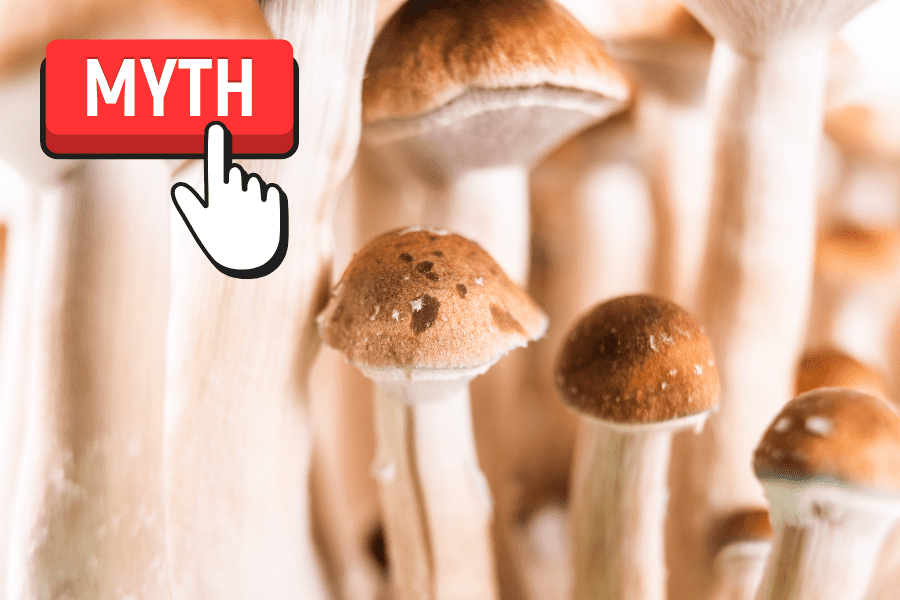7 Myths About Microdosing

Microdosing psilocybin has captured global attention as people explore new ways to support creativity, mood, and overall well-being. While interest continues to grow, a wide range of myths and misconceptions still surround the practice. Some stem from decades of prohibition, while others come from exaggerated claims within wellness communities. Understanding the facts helps separate realistic benefits from misinformation.
Why Are There So Many Myths?
For many years, psychedelics were misunderstood due to stigma, fear-based messaging, and limited research access. At the same time, enthusiastic supporters sometimes overstate what microdosing can accomplish. The reality sits somewhere in between—microdosing may offer benefits, but it is neither a miracle cure nor inherently harmful when approached responsibly. Clear, accurate information reduces anxiety and supports safer, more intentional use. Below are the most common myths surrounding microdosing psilocybin.
Myth 1: “Microdosing Is Addictive”
Psilocybin is not considered chemically addictive and shows extremely low dependence potential. It also creates rapid tolerance, meaning repeated daily use quickly diminishes effects. This makes compulsive use unlikely. As with any habit, intention matters—microdosing should support growth, not avoidance.
Myth 2: “Microdosing Causes Brain Damage”
This belief comes from outdated anti-drug messaging rather than evidence. Current research suggests psilocybin may actually support neuroplasticity by encouraging new neural connections. There is no scientific evidence showing that microdosing damages the brain.
Myth 3: “Magic Mushrooms Are Just a Party Drug”
Microdosing is not recreational intoxication. Doses are far too small to cause hallucinations or impairment. Most people microdose to support focus, emotional balance, or creativity—not for partying or escapism.
Myth 4: “Everyone Has the Same Experience”
Responses to psilocybin vary widely. Genetics, mindset, environment, and personal history all influence outcomes. Even at microdose levels, effects are subtle and highly individual.
Myth 5: “Microdosing Leads to Instant Enlightenment”
Microdosing is not a shortcut to spiritual awakening. While it may support reflection or awareness, meaningful growth still requires effort, integration, and intentional practice.
Myth 6: “Capsules Are Better Than All Other Formats”
No format is inherently superior—the dose matters most. Capsules offer precision, while dried mushrooms allow for flexible experimentation. Many beginners choose microdose capsules for consistency, while others prefer loose formats for customization.
Myth 7: “Microdosing Is Just a Placebo”
While placebo effects can play a role in any wellness practice, multiple observational studies report measurable improvements in mood, creativity, and emotional regulation. Research suggests microdosing is more than expectation alone, though ongoing studies continue to refine our understanding.
The Bottom Line
Microdosing is often misunderstood, but separating fact from fiction allows for safer and more grounded exploration. Psilocybin is not addictive, does not harm the brain, and is not a guaranteed path to enlightenment—but it may support cognitive and emotional well-being when used responsibly. Those interested in starting often explore dried magic mushrooms or pre-measured options for accuracy and consistency. Discreet same-day delivery is available in Brampton, Vaughan, and Richmond Hill, making access convenient throughout the GTA.
I don’t think the title of your article matches the content lol. Just kidding, mainly because I had some doubts after reading the article.
Your point of view caught my eye and was very interesting. Thanks. I have a question for you.
Thanks for sharing. I read many of your blog posts, cool, your blog is very good.
Your point of view caught my eye and was very interesting. Thanks. I have a question for you. https://www.binance.com/register?ref=IXBIAFVY